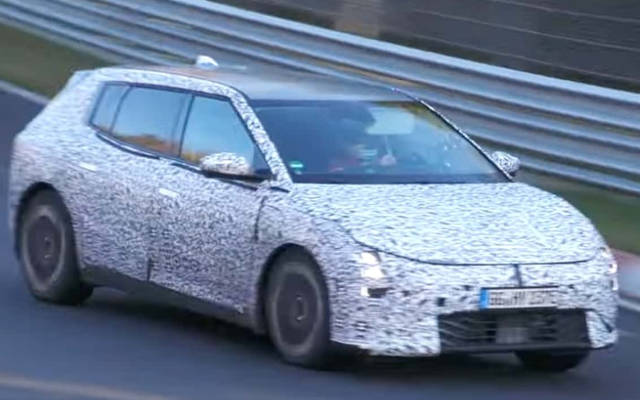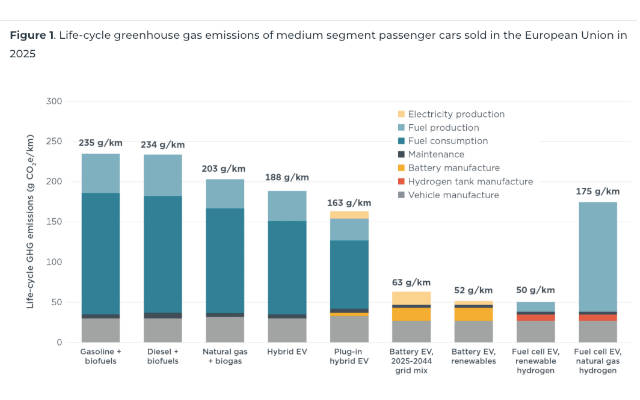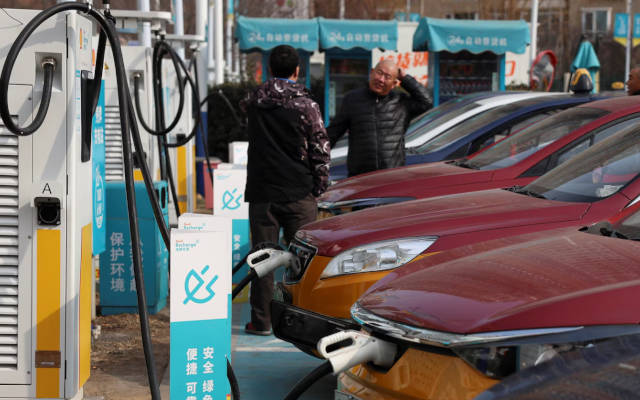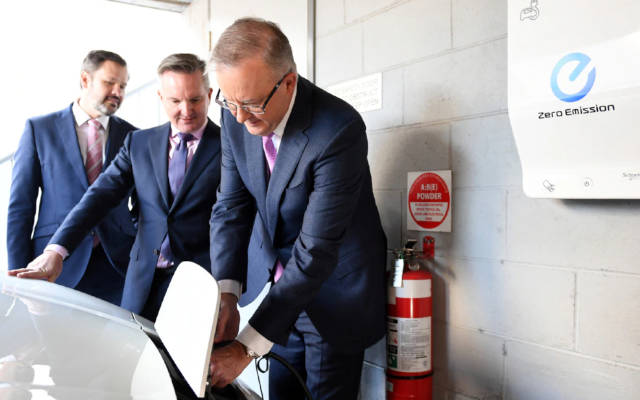 EDITOR'S PICK
EDITOR'S PICK
The Kia EV4 Ran For 6,200 Miles At The Nurburgring. Its Battery Wouldn't Die
06 Aug 2025 | Synopsis
 Kia subjected the EV4 to a grueling 6,200‑mile battery stress test at Nurburgring - flooring it repeatedly and using fast charging - and found its battery retained 95% health, equivalent to over 160,000 miles of "real‑world" driving. Overall testing exceeded 74,000 miles, demonstrating exceptional battery resilience. Kia also backs the EV4 with a warranty guaranteeing at least 70% capacity after 100,000 miles or eight years.
Kia subjected the EV4 to a grueling 6,200‑mile battery stress test at Nurburgring - flooring it repeatedly and using fast charging - and found its battery retained 95% health, equivalent to over 160,000 miles of "real‑world" driving. Overall testing exceeded 74,000 miles, demonstrating exceptional battery resilience. Kia also backs the EV4 with a warranty guaranteeing at least 70% capacity after 100,000 miles or eight years.The First Fully Electric Venetian Water Taxi Can Cruise the Canals All Day
06 Aug 2025 | Synopsis
 Venice's first fully electric water taxi, Lucietta, was unveiled by Swiss energy firm Repower. Designed by Nauta Design and built in Murano, Lucietta combines traditional Venetian styling with electric propulsion—powered by a 200 kW motor and 180 kWh battery system. It can cruise a full working day (7–20 km/h) on a single charge, emits no direct pollutants, and cuts energy use by around 60% compared to diesel boats.
Venice's first fully electric water taxi, Lucietta, was unveiled by Swiss energy firm Repower. Designed by Nauta Design and built in Murano, Lucietta combines traditional Venetian styling with electric propulsion—powered by a 200 kW motor and 180 kWh battery system. It can cruise a full working day (7–20 km/h) on a single charge, emits no direct pollutants, and cuts energy use by around 60% compared to diesel boats.ICCT Study Ends Debate: EVs Drastically Cleaner Than Gasoline Cars
04 Aug 2025 | Synopsis
 A definitive life-cycle study by the ICCT confirms EVs in Europe are drastically cleaner than gas cars. Even including battery manufacturing, an EV's lifetime emissions are 66-69% lower. The initial "carbon debt" from production is repaid within just 1-2 years of driving. This environmental advantage is set to grow significantly as electricity grids become cleaner, validating pro-EV policies.
A definitive life-cycle study by the ICCT confirms EVs in Europe are drastically cleaner than gas cars. Even including battery manufacturing, an EV's lifetime emissions are 66-69% lower. The initial "carbon debt" from production is repaid within just 1-2 years of driving. This environmental advantage is set to grow significantly as electricity grids become cleaner, validating pro-EV policies.Your EV's Battery May Be Spying On You, New Study Reveals
04 Aug 2025 | Synopsis
 A new study from Chinese universities reveals hackers can track your EV. By analyzing your battery's unique "power fingerprint" at a public charger, they can reconstruct your exact driving routes, including home and work. This low-cost side-channel attack exposes a major privacy risk in the vehicle's battery management system, revealing a new frontier for automotive cybersecurity that goes beyond just software.
A new study from Chinese universities reveals hackers can track your EV. By analyzing your battery's unique "power fingerprint" at a public charger, they can reconstruct your exact driving routes, including home and work. This low-cost side-channel attack exposes a major privacy risk in the vehicle's battery management system, revealing a new frontier for automotive cybersecurity that goes beyond just software.EV Batteries Are Fit To Run A Home Or Even Power The Grid – But Some Car Brands Say "No"
04 Aug 2025 | Synopsis
 Vehicle-to-Grid (V2G) technology, which allows EVs to power the grid, faces significant roadblocks in Australia. The high cost and lack of compatible cars and chargers are key barriers. Unclear regulations, complex payment systems for EV owners, and consumer concerns about potential battery degradation are also hindering its widespread adoption. Overcoming these hurdles is crucial to unlocking V2G's potential to help stabilize the electricity grid.
Vehicle-to-Grid (V2G) technology, which allows EVs to power the grid, faces significant roadblocks in Australia. The high cost and lack of compatible cars and chargers are key barriers. Unclear regulations, complex payment systems for EV owners, and consumer concerns about potential battery degradation are also hindering its widespread adoption. Overcoming these hurdles is crucial to unlocking V2G's potential to help stabilize the electricity grid.
 EVWorld Exclusive
EVWorld Exclusive
Unlocking Heat's Hidden Potential: How a Nanoscale Discovery Could Transform Everyday Tech
24 Oct 2025 |  A recent nanoscale physics breakthrough reveals heat can transfer across tiny gaps far more efficiently than expected - up to 100 times greater than classical predictions. This could revolutionize cooling and energy systems in electronics, EVs, and smart appliances. While engineering challenges remain, early applications may emerge within 3-5 years, with broader consumer adoption possible in the next decade. The future of heat management may be silent, solid-state, and radically efficient.
A recent nanoscale physics breakthrough reveals heat can transfer across tiny gaps far more efficiently than expected - up to 100 times greater than classical predictions. This could revolutionize cooling and energy systems in electronics, EVs, and smart appliances. While engineering challenges remain, early applications may emerge within 3-5 years, with broader consumer adoption possible in the next decade. The future of heat management may be silent, solid-state, and radically efficient.
Turning the Energy Crunch into a Smart Grid Revolution
24 Oct 2025 |  America's energy crunch is not about supply - it's about coordination. Virtual power plants and vehicle-to-grid systems offer a scalable, software-driven solution to rising demand from AI, EVs, and climate volatility. By turning homes, vehicles, and businesses into active grid assets, and aligning policy with technology, the U.S. can build a smarter, more resilient energy future without building more power plants. The tools exist - now it's time to connect them.
America's energy crunch is not about supply - it's about coordination. Virtual power plants and vehicle-to-grid systems offer a scalable, software-driven solution to rising demand from AI, EVs, and climate volatility. By turning homes, vehicles, and businesses into active grid assets, and aligning policy with technology, the U.S. can build a smarter, more resilient energy future without building more power plants. The tools exist - now it's time to connect them.
Auto Retail in 2025: Bridging the Trust Gap Between Dealers and Buyers
24 Oct 2025 |  The 2025 Urban Science and Harris Poll report reveals a growing disconnect between dealers and buyers. While dealers embrace EVs, AI, and digital tools, many buyers remain cautious - especially about full electrification and online-only retail. Brand loyalty is weakening, and policy clarity is key to adoption. The future of auto retail depends on bridging trust, flexibility, and infrastructure gaps.
The 2025 Urban Science and Harris Poll report reveals a growing disconnect between dealers and buyers. While dealers embrace EVs, AI, and digital tools, many buyers remain cautious - especially about full electrification and online-only retail. Brand loyalty is weakening, and policy clarity is key to adoption. The future of auto retail depends on bridging trust, flexibility, and infrastructure gaps.
Electric Icons in the Making: Audi Concept C vs. Chevrolet Corvette EV
23 Oct 2025 |  Audi's Concept C previews a refined electric GT built on the mature PPE platform, likely arriving by 2026. Chevrolet's Corvette EV promises supercar performance but faces packaging and thermal challenges. Audi is closer to production; Corvette remains in early development. Both reflect divergent strategies in electrifying legacy sports cars, with Audi emphasizing platform maturity and Chevrolet pursuing brand continuity through engineering innovation.
Audi's Concept C previews a refined electric GT built on the mature PPE platform, likely arriving by 2026. Chevrolet's Corvette EV promises supercar performance but faces packaging and thermal challenges. Audi is closer to production; Corvette remains in early development. Both reflect divergent strategies in electrifying legacy sports cars, with Audi emphasizing platform maturity and Chevrolet pursuing brand continuity through engineering innovation.
Electrification Is Not an Oversimplification
23 Oct 2025 |  Despite critiques that the quest for global electrification is "simplistic", the transition is strategic and necessary. Grid upgrades, battery innovation, and tailored policies make electrification viable. Sodium-ion batteries and recycling reduce material risk. Compared to fossil fuels, electrification offers cleaner, safer, and more resilient systems. Complexity demands better design - not delay.
Despite critiques that the quest for global electrification is "simplistic", the transition is strategic and necessary. Grid upgrades, battery innovation, and tailored policies make electrification viable. Sodium-ion batteries and recycling reduce material risk. Compared to fossil fuels, electrification offers cleaner, safer, and more resilient systems. Complexity demands better design - not delay.
SEARCH RSSTREAM
 16 New Postings In Past 24 Hours
16 New Postings In Past 24 Hours
Category:mobility
Region:NoAmerica
Date:26 Oct 2025
Category:mobility
Region:AsiaPacific
Date:26 Oct 2025
Category:recall
Region:NoAmerica
Date:26 Oct 2025
Category:energy
Region:Europe
Date:26 Oct 2025
Category:mobility
Region:Europe
Date:26 Oct 2025
Category:policy
Region:NoAmerica
Date:26 Oct 2025
Category:mobility
Region:NoAmerica
Date:26 Oct 2025
Category:mobility
Region:Europe
Date:26 Oct 2025
Category:mobility
Region:Europe
Date:26 Oct 2025
Category:energy
Region:NoAmerica
Date:26 Oct 2025
Category:finance
Region:NoAmerica
Date:26 Oct 2025
Category:environment
Region:Global
Date:25 Oct 2025
Category:finance
Region:NoAmerica
Date:25 Oct 2025
Category:finance
Region:NoAmerica
Date:25 Oct 2025
Category:mobility
Region:Europe
Date:25 Oct 2025
Category:energy
Region:Europe
Date:25 Oct 2025
Category:environment
Region:MidEast
Date:25 Oct 2025
Category:mobility
Region:AsiaPacific
Date:25 Oct 2025
Category:finance
Region:NoAmerica
Date:25 Oct 2025
Category:mobility
Region:Global
Date:25 Oct 2025
